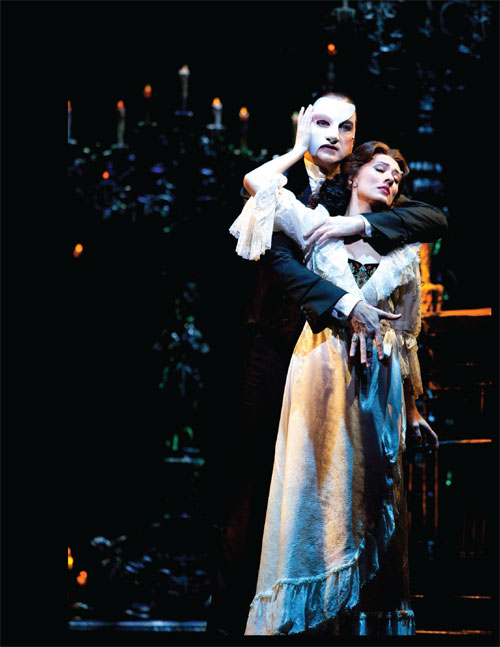Musical theater tops in China
Updated: 2015-07-03 10:55
By Zhang Kun in Shanghai(China Daily USA)
|
||||||||
Various live musical productions have been staged or are in the works, as Chinese audiences increasingly embrace the genre.
The musical is becoming the most popular theater genre in China's live show market.
Every year a few foreign musicals have been staged in Shanghai. Almost all the established Broadway musicals have been to Shanghai, from Les Miserables, to The Phantom of the Opera, Cats, Lion King and even the more classic Sound of Music.
In the past few years audiences in Shanghai have seen musicals from the less familiar context, such as Romeo and Juliet in French, and Elisabeth in German language.
The current musical on tour in China is Ghost, the international tour edition in English, and will hopefully have a Chinese edition in the future. Next year, Sister Act, also adapted from a film starring Whoopie Goldberg, will be staged in Shanghai as well.
Although War Horse is not strictly a musical play, it will have lots of music, with live singing performed on stage. The Chinese edition will premiere later this year. "It's going to be phenomenal, and may change the outlook of China's live theater scene," said Zhao Chenlin, a member of the production team of War Horse in Chinese.
The play will cost tens of millions of yuan to make, she said. This project could be the largest production of live theater in China so far.
Besides imports from Broadway, West End and other parts of the world, China's theater companies are also producing translated editions of well-received musicals, and creating original plays of their own.
The most successful Chinese edition of a Broadway musical so far is Mamma Mia. In the past three years, more than 400 shows have been staged. United Asia Entertainment is the new production company founded for the production of Mamma Mia in Chinese, with investment from China Arts and Entertainment Group (CAEG), Shanghai Media Group (SMG) and CJ E&M, a company of live entertainment from South Korea.
The company also produced the Chinese edition of Cats, which has had more than 200 shows in two seasons. Neither Mamma Mia nor Cats are being shown at the moment, and United Asia is now recruiting actors for the Chinese edition of Lion King, which will be presented at the Walt Disney theater in Shanghai's Disneyland Park, which is scheduled to open in spring 2016.
Ultimate Broadway
Shanghai Culture Square is China's first theater designed and constructed especially for the performance of musicals. Since its opening four years ago, the theater has systematically introduced musicals from various parts of the world, as well as popular plays from Broadway and West End.
The theater began to produce its own shows three years ago, and created the Ultimate Broadway series, a gala concert of musical highlights that is presented every year.
The upcoming Ultimate Broadway show will cost up to 10 million yuan ($1.6 million) to produce, according to Fei Yuanhong, artistic director of the theater. Shanghai Culture Square will create the settings, props and stage designs, hire veteran designers and directors to work with recognized actors from Broadway and West End.
The concert has become an established brand among Shanghai's musical lovers so that once the box office opened, "a ticket was sold every eight seconds," Fei said.
A concert is more "executable, or "operable", he said, than a full-length musical play. In a mature market such as Broadway, a musical is regarded successful after 100 to 200 performances, while in China, no theater show has had such vitality yet.
Fei anticipated that in five years' time maybe, China's market will be strong enough for residential musical performances that will go on for years, "when those born in the 1980s become the majority of China's middle class population."
Fast growth
The whole Asian market for musical theater has developed rapidly in the past decades. In China, the rapid development of the market has allured heavy investment in the live theater industry, especially musical theater.
There have been dozens of original Chinese musicals, and more are on the way, each with a production cost of tens of millions yuan. Tiny Times, a novel by young celebrity author Guo Jingming, has been made into an extremely profitable film franchise, and lately a musical production has been made. With its first round of shows staged in May, the musical is under revision, and hopefully will tour to wider parts of China later this year.
An original production Yip Man, which combines musical theater with Chinese kungfu, is being made in Shanghai, and will have its premiere in Singapore next year. According to the producer Wang Hongming, the play is aimed for the international market.
David Zhou is the producer who has introduced Ghost to China. He believes the story has universal appeal, especially the power of love that breaks the boundary between life and death. "In traditional Chinese literature and folklore, we have lots of stories about the love between human and ghosts, I think Chinese audiences will love the story."
Zhou became interested in musical theater in the 1990s, when he worked in a company that made DVD. While the retail market was dominated by piracy at that time, Zhou and his colleagues bought copyright from international film and entertainment studios, and sold these authorized DVDs in public bookstores and alongside with the DVD players, with collaboration arranged with the hardware producers.
He was the first to introduce a collection of Andrew Lloyd Webber's musical creations on DVD, and he even invested in a TV show, which systematically introduced Broadway musicals to audiences in Shanghai.
When he became involved in the business of live entertainment, he found the key part has remained the same as in the DVD business, which is intellectual property, or copyright.
It was producer Colin Ingram from Britain who came up with the idea of adapting the film Ghost from 1990, starring Demi Moore, Patrick Swayze and Whoopie Goldberg for musical theater. He was the one who convinced the original writer Bruce Joel Rubin to entrust the story to him, and the film studio to grant the right for adaptation. The producer then hired the writer and composer to work on the story, and worked on where music and songs could fit in with the storytelling.
There is a saying in the industry that goes "a song should deliver 30 pages of dialogue". They carry the emotional flow, and keep audiences engaged and entertained. In Ghost, the musical, all the songs were new compositions by Dave Stewart and Glen Ballard, except for the golden hit Unchained Melody by the Righteous Brothers. That song, together with the scene where the heroine played by Demi Moore was making pottery, was probably the most unforgettable from the film.
The live theater production has the pottery scene with Unchained Melody, and still, they have to deliver something more than the film.
It is 25 years since the film came out, said Ingram in Shanghai. He needed to present the story on a different canvas, of the musical theater, and bring fresh feelings to make it attractive to young audiences.
Illusion acts designed by professional magicians helped to present how a ghost is trapped between two worlds. When audiences see the actor walking away while his dead body still seen lying on the stage, they were bemused; and they were excited to see the ghost walk through a concrete door, moving things around without laying his hand on it. These magic acts appeared a few times, as powerful tools to engage the audience and "to serve the story", as Ingram, the producer, insisted, "we don't want to make it a show about magic".
The musical theater has seen a growing number of productions adapted from films, Ingram admitted. From Hair Spray to Billy Elliot, and now even 50 Shades of Grey already has a musical production. Ingram himself is working on the adaptation of Back to the Future, a science-fiction movie from the 1990s.
A Broadway production can easily cost $15 million to $20 million to make. The theater adaptation of Spiderman cost $72 million to make, though the musical has not turned out quite well received by the theatergoers.
The film will provide some degree of reassurance for investors to make such a big commitment. Ingram said. Also, the film franchise has established brand awareness among the public, which also helps to build confidence for the live theater box office.
This trend has brought new challenges for theater workers, though. They have to keep coming up with new ideas to meet with the anticipations of today's audiences, who have seen it all, thanks to all the visual effects and computer graphics of the 21st Century: explosion, space walk, superheroes flying between skyscrapers, you name it, they have seen it on the screen, big or small.
Theater provides a different experience though, as Ingram said. Theater has the advantage of building emotional connection with audiences in a strange way. "It has more tools to make people cry, or laugh. This experience of sitting in the dark, with a group of actors, designers and creative people doing a show especially for you, it just can't be copied," he added.
zhangkun@chinadaily.com.cn
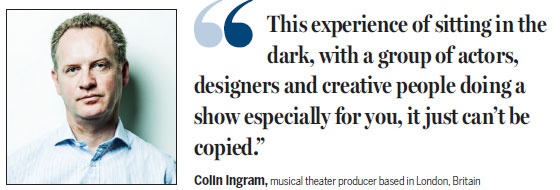
|
A scene from Ghost (left), an English musical on tour in China this year, and the others from the Chinese edition of Mamma Mia, which has had more than 400 shows in the past three years. |
|
Musicals such as The Phantom of the Opera, have found their way into China's theaters. Not only Broadway and West End productions are staged, but also Chinese editions and original creations are being made. Photos provided to China Daily |
(China Daily USA 07/03/2015 page9)
- Injured ROK tourists in intensive care
- 36 dead, 26 missing after banca capsized in C. Philippines
- Thai navy plans to buy three Chinese subs
- Mass casualties in Indonesian military plane crash
- Japan's LDP lawmaker denounces Abe's security policies
- More than 100 feared dead in Indonesian military plane crash

 Western Europe swelters in long-lasting heat wave
Western Europe swelters in long-lasting heat wave
 Top 10 shareholders of AIIB
Top 10 shareholders of AIIB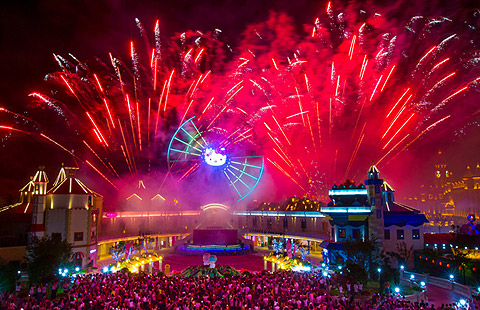
 Massive Hello Kitty theme park opens to visitors
Massive Hello Kitty theme park opens to visitors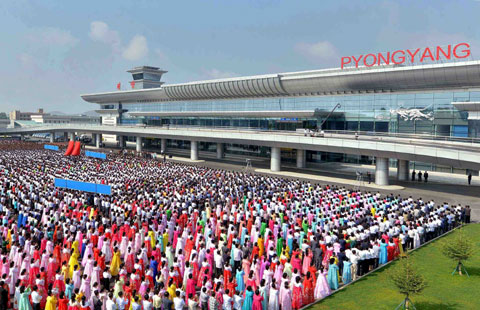
 New terminal of Pyongyang Intl Airport put into use
New terminal of Pyongyang Intl Airport put into use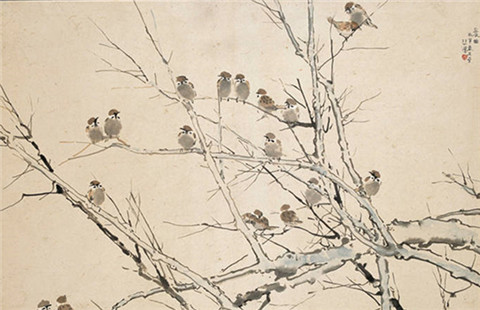
 Ten paintings to remember Xu Beihong
Ten paintings to remember Xu Beihong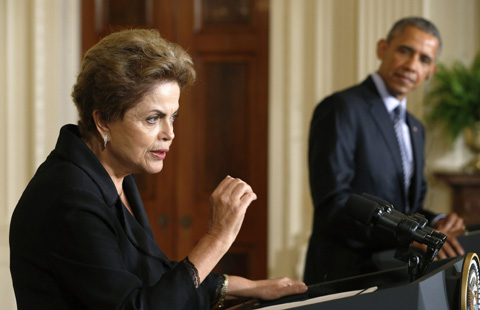
 Obama hails new chapter in US-Brazil relations
Obama hails new chapter in US-Brazil relations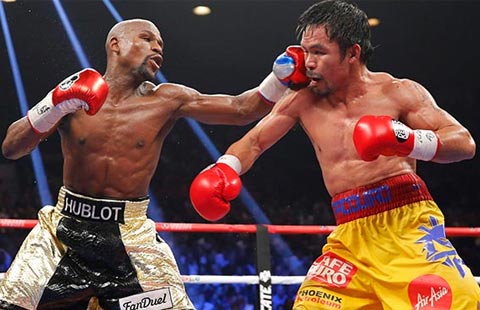
 Boxers top Forbes highest paid celebrities list
Boxers top Forbes highest paid celebrities list
 Not so glamorous: Glastonbury ends with sea of rubbish
Not so glamorous: Glastonbury ends with sea of rubbish
Most Viewed
Editor's Picks

|

|

|

|

|

|
Today's Top News
Economic growth driving force for China's future mobility: Think tank
'Operation duck' and the student savior from internment camp
White House lifts ban on cameras during public tours
China, Canada seek to increase agricultural trade
A Canadian comes to Xi'an, finds personal, business success
Fewer Chinese seek US grad schools
US, Cuba to announce reopening of embassies on Wednesday
China bests MDGS for improved drinking water, sanitation
US Weekly

|

|

